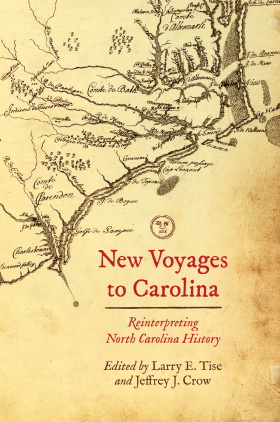Don’t worry about the monuments coming down.
There is more. People are rewriting our history.
Some folks who oppose taking down Civil War monuments argue that such actions would destroy important history.
Meanwhile, a group of prominent North Carolina historians are revising our state’s history, and they are doing it proudly.
 “New Voyages to Carolina: Reinterpreting North Carolina History,” was published this month by UNC Press. Several years ago the volume’s editors, Larry Tise and Jeffrey Crow, both former directors of North Carolina’s Division of Archives and History, concluded, “We need a new narrative for North Carolina’s history!”
“New Voyages to Carolina: Reinterpreting North Carolina History,” was published this month by UNC Press. Several years ago the volume’s editors, Larry Tise and Jeffrey Crow, both former directors of North Carolina’s Division of Archives and History, concluded, “We need a new narrative for North Carolina’s history!”
Crow writes, “Whereas older studies emphasized great white men, chronology, politics, institutions, wars, and a Whiggish faith that history is an inexorable march toward progress, newer works take a much more critical view. Historians have begun to look at race, class, and gender as new tools for deconstructing the past. The new paradigm focuses on social history, class conflict, gender-based studies, the African American experience (including civil rights), economic development, and working-class struggles.”
The editors and about 16 other prominent historians contribute essays on topics that include “Europeans in the Indians’ Old World,” “Linthead Stomp: Carolina Cotton Mill Hands and the Modern Origins of Hillbilly Music,” “Defying Brown, Defying Pearsall: African Americans and the Struggle for Public School Integration in North Carolina, 1954-1971,” and “ Chasing Smokestacks: Lessons and Legacies.”
Tise and Crow believe that these essays and an avalanche of new research during the past few years require a new framework to guide us in studying our state’s history.
At a meeting of the Historical Society of North Carolina last week in Chapel Hill and in an essay titled “A New Description of North Carolina,” written for the new book, Tise and Crow suggest that the important periods of the state’s history can be broken down into:
(1) Possessing the land, prehistory to 1713. Until 1713, when the Tuscarora Indians were decisively defeated and scattered, European presence and settlement depended on accommodation from the native inhabitants of the colony.
(2) Choosing the rulers, 1713-1835. The Constitutional Convention of 1835 limited participation in government to “freemen,” effectively limiting the ruling class to white males.
(3) Defining the realm, 1835-1900. During this period, Tise and Crow write, a “vision of North Carolina as a virtuous republican state emerged slowly….As vicious and destructive as the Civil War was, that great conflict neither shattered nor essentially modified the basic North Carolina story that it was and always would be a virtuous and moderate republic.”
(4) Pursuing progress, 1900-1980. During this time North Carolina sought to be a progressive state, one that promoted education and sought economic development, even though, as Tise and Crow assert, its self-image was based on the premise that “only white males could rule properly.”
(5) Turf wars and bragging rights, 1980-present. These years feature the struggles for power by the political factions and the major political parties. Tise and Crow opine that the shift in power from Democratic to Republican control is not a seismic shift. “North Carolina’s proud reputation as a progressive state will most likely not be permanently tarnished by the proceedings of either a liberal or a conservative governor or General Assembly.”
They continue, “North Carolina has always been something of a middling state–a lot of people, a lot of diversity, a complicated geo-physical landscape, moderate aspirations, low taxes and low salaries, some talented and renowned expatriates, a good state university and many outstanding private colleges, and barely adequate schools.”
Tise and Crow’s assessment of North Carolina’s progressivism should be a challenge to progressives of all political parties to commit to work for a kind of progressivism that will eliminate every vestige of our state’s “middlingness.”
D.G. Martin hosts “North Carolina Bookwatch,” which airs Sundays at noon and Thursdays at 5 p.m. on UNC-TV. Preview the upcoming program on Preview the upcoming program on UNC-TV’s North Carolina digital channel (Spectrum #1276) on Fridays at 8 p.m.
This Thursday’s s (October 26) guest is Former Gov. Jim Martin, author of “Revelation through Science.” Next week’s (October 29, November 2) guest is Belle Boggs, author of “The Art of Waiting.”
To view prior programs: http://video.unctv.org/program/nc-bookwatch/episodes/
For upcoming programs: www.unctv.org/ncbookwatch


Comments on Chapelboro are moderated according to our Community Guidelines